Many protestants and Christian sects reject Catholic Tradition but with time some of them have admitted some of the traditions – such as Lutherans, Episcopalians and Evangelicals. They are all governed by a certain supreme authority – The Queen of England is the head of the Anglican Church, the King of Prussia was at the head of the Reformed Lutherans, and there is scarcely a non-Catholic denomination in which some sort of ‘board of directors’ is not vested with a supreme authority in its administration. Many denominations reject all Catholic Traditions on the grounds that they are subject to corruption. When any doctrine, they claim, is carried on for generations – from father to son – necessarily so many legends and myths arise that little truth is left.
This is an affirmation on their part that the Church is not infallible. What, according to them, happened to the Holy Spirit, the Paraclete? Had they believed that the Church is infallible, they would not have forgotten so soon the assistance promised to the Church by Christ.
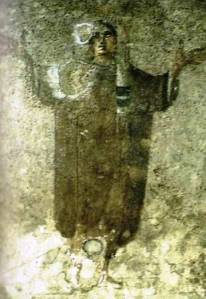 They forgot that, strictly speaking, all Revelation, whether contained in the Scriptures or in other documents, on monuments, on the walls of the catacombs, in usages, and so on, were all written down and transmitted to posterity. The Apostles wrote that part of Revelation which is contained in the Scriptures, while their disciples wrote what the Apostles preached, taught or instituted in the Church, but which had not been written by the Apostles.
They forgot that, strictly speaking, all Revelation, whether contained in the Scriptures or in other documents, on monuments, on the walls of the catacombs, in usages, and so on, were all written down and transmitted to posterity. The Apostles wrote that part of Revelation which is contained in the Scriptures, while their disciples wrote what the Apostles preached, taught or instituted in the Church, but which had not been written by the Apostles.
It is a mistake to speak only of an oral tradition carried on from generation to generation through the help of word of mouth. For Tradition, in the first place, is not ‘oral’ in the sense that it is maintained and propagated ‘only’ through man’s lips. 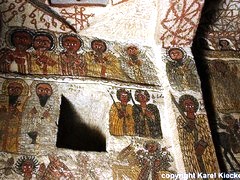 It is oral in the sense that in the beginning it was received by the Faithful from the Apostles themselves, not in writing, but through their preaching, teaching or institutions, established in the Church by the same Apostles. What the apostles did not write, but preached, taught or instituted, was afterwards written by their immediate disciples, and sometimes by the disciples of these immediate Apostolic disciples (the Church Fathers). Therefore Tradition is ‘oral’ not in the sense that it was never written, but in the sense that ‘what in the beginning was not written’ by the inspired authors was written ‘afterwards’ by their disciples. What the disciples heard or were taught by the Apostles and not committed to the Scriptures, they afterwards laid down in writing. Tradition is ‘oral’ as distinguished from that part of Revelation which was written by the Apostles – namely, Scripture. For what the Apostolic disciples afterwards wrote, as heard, learned or as instituted by the Apostles, is what we call, properly speaking, Tradition.
It is oral in the sense that in the beginning it was received by the Faithful from the Apostles themselves, not in writing, but through their preaching, teaching or institutions, established in the Church by the same Apostles. What the apostles did not write, but preached, taught or instituted, was afterwards written by their immediate disciples, and sometimes by the disciples of these immediate Apostolic disciples (the Church Fathers). Therefore Tradition is ‘oral’ not in the sense that it was never written, but in the sense that ‘what in the beginning was not written’ by the inspired authors was written ‘afterwards’ by their disciples. What the disciples heard or were taught by the Apostles and not committed to the Scriptures, they afterwards laid down in writing. Tradition is ‘oral’ as distinguished from that part of Revelation which was written by the Apostles – namely, Scripture. For what the Apostolic disciples afterwards wrote, as heard, learned or as instituted by the Apostles, is what we call, properly speaking, Tradition.
 The Apostles, who were the ‘ancients’ and legislators of the Church, instituted certain days of the week or certain seasons of the year as time of penance, of joy or of rest, to be observed by all. Abstinence from meat on Friday, fasting in Lent, the Sunday observance instead of Saturday, Easter Joys, the ceremonies of Holy Mass, etc., were instituted by the Apostles as a help to the Christian to save his soul and as an ornament to divine worship.
The Apostles, who were the ‘ancients’ and legislators of the Church, instituted certain days of the week or certain seasons of the year as time of penance, of joy or of rest, to be observed by all. Abstinence from meat on Friday, fasting in Lent, the Sunday observance instead of Saturday, Easter Joys, the ceremonies of Holy Mass, etc., were instituted by the Apostles as a help to the Christian to save his soul and as an ornament to divine worship.  All these things were a part of the routine of the Church. All accepted them as a matter of course and as a part of the daily life of the Church. Hence, there was no necessity on their part to write them down – they preached and taught the Faithful what they must do as members of the Church of Jesus Christ. It was therefore natural that what the Apostles did not write, their disciples, in order to refresh their memories, as well as to transmit it to other generations, did write, according to the warning of St. Paul, ‘to teach others also’ (2 Tim 2:2). ‘Hold the traditions, which you have learned, whether by word, or by our epistle’ (2 Thess 2:14).
All these things were a part of the routine of the Church. All accepted them as a matter of course and as a part of the daily life of the Church. Hence, there was no necessity on their part to write them down – they preached and taught the Faithful what they must do as members of the Church of Jesus Christ. It was therefore natural that what the Apostles did not write, their disciples, in order to refresh their memories, as well as to transmit it to other generations, did write, according to the warning of St. Paul, ‘to teach others also’ (2 Tim 2:2). ‘Hold the traditions, which you have learned, whether by word, or by our epistle’ (2 Thess 2:14).
Traditions, therefore, according to St. Paul, are of two kinds, written and unwritten. The written are the Scriptures, because tradition means anything that is delivered or transmitted to others. In this case, the Scriptures are traditions, although improperly so called. The unwritten are all those other Traditions which are not contained in the Scriptures, but which, as the Apostle says, his disciples received through his preaching. They are properly called ‘Traditions’.
As both kinds of Traditions – received, as the Apostle says, ‘through my preaching’ (properly called Traditions) ‘and through my Epistle’ (The Scriptures, improperly called Traditions) – come to us from the Apostles, both are to be accepted, both are to be believed, both must be lived up to because, according to the command of the Apostle, we must hold both.
 The written Traditions, or the Scriptures, contain the greater part of Revelation. But it is not less true that what the Apostles preached, taught or instituted in the Church, but did not write, are a very important part of the Deposit of Faith. They were written by their disciples.
The written Traditions, or the Scriptures, contain the greater part of Revelation. But it is not less true that what the Apostles preached, taught or instituted in the Church, but did not write, are a very important part of the Deposit of Faith. They were written by their disciples.
Therefore, the objection collapses, that Traditions, being oral, become corrupted in the course of time. Tradition, strictly speaking, is not oral. It was only such in its first proclamation. All Traditions have been written, if not by the Apostles, certainly by the Church. As pastors and doctors, or as writers of the Church, the first Christians wrote what they heard or learned from the Apostles, or what was practiced in the Church. They wrote not as inspired writers, but simply as common teachers or believers who had nothing else in view but to defend and protect the Deposit of Faith. God, in His Providence, induced those men to write, to be witnesses of that Faith which is always old and always new, feeble and still strong. Although written in the documents of old, Tradition is still better written in the hearts of the Faithful and deeply engraved in the religious practices and belief of the Church.
What a presumption it was on the part of the Protestant Reformers (and still is on the part of many Christian denominations and sects) to claim that they knew better than the Fathers what the government and doctrine of the Church had been during the first three centuries! The Fathers were men of great learning and piety. They enlightened the Church and glorified the Faith with their great works. They were the great men of their times, writing first-hand about their contemporaries. And they testify that, besides the Scriptures, which they saved from oblivion and total loss, there is also in the Church another ‘Rule of Faith’ and that is the Church herself, to which Christ and the Apostles delivered the Deposit of Faith.


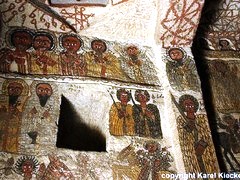





































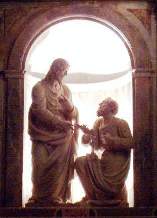


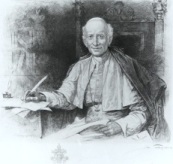










Recent Comments